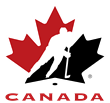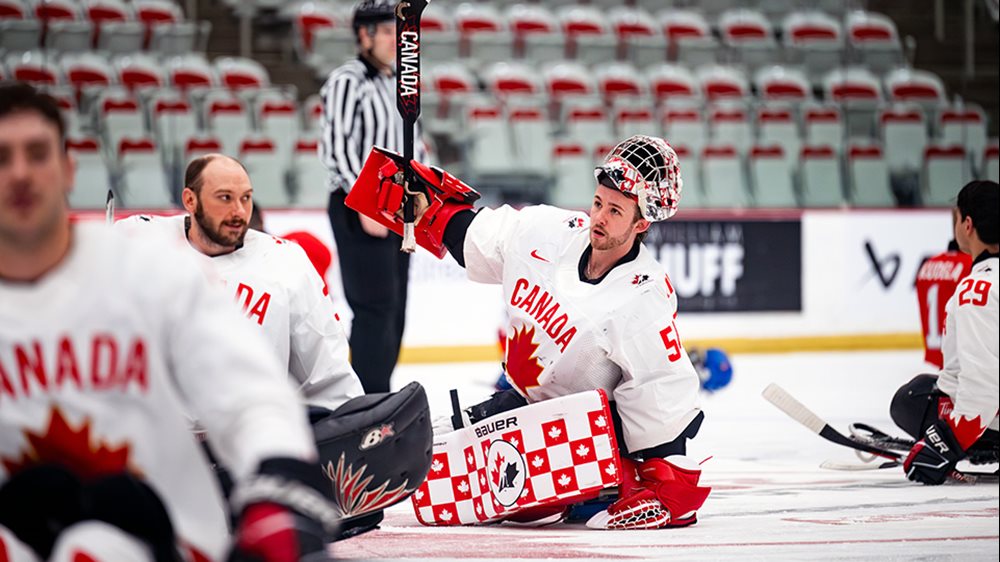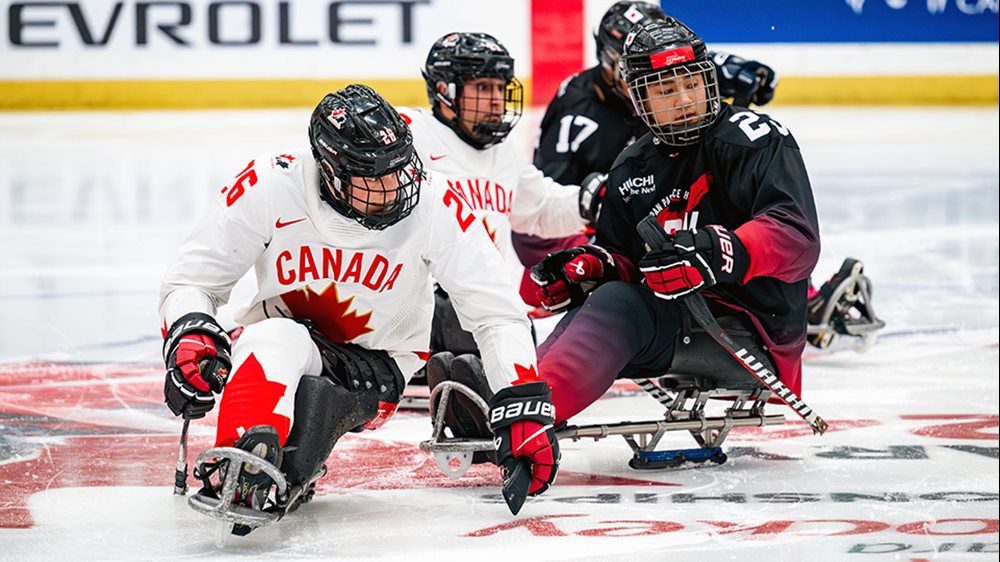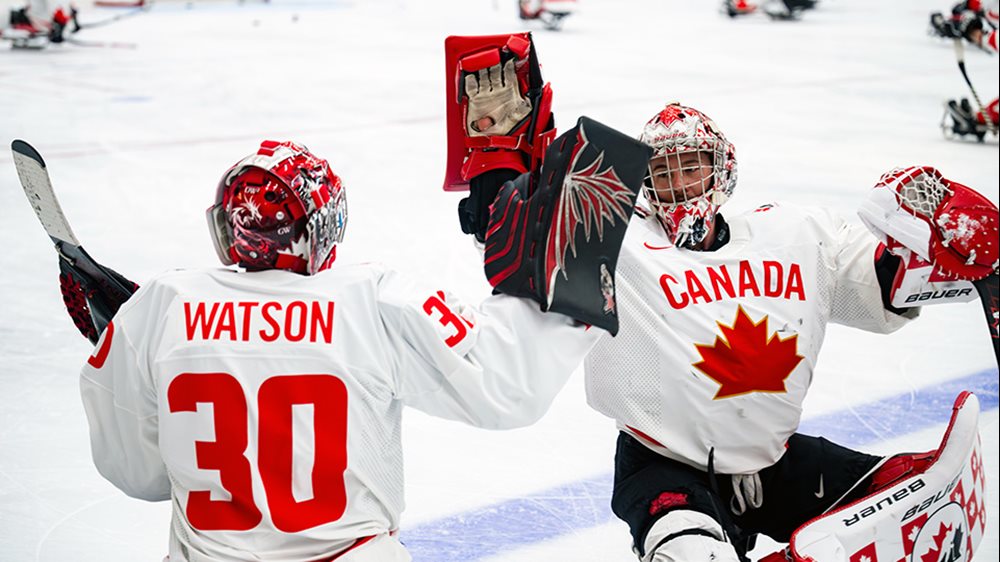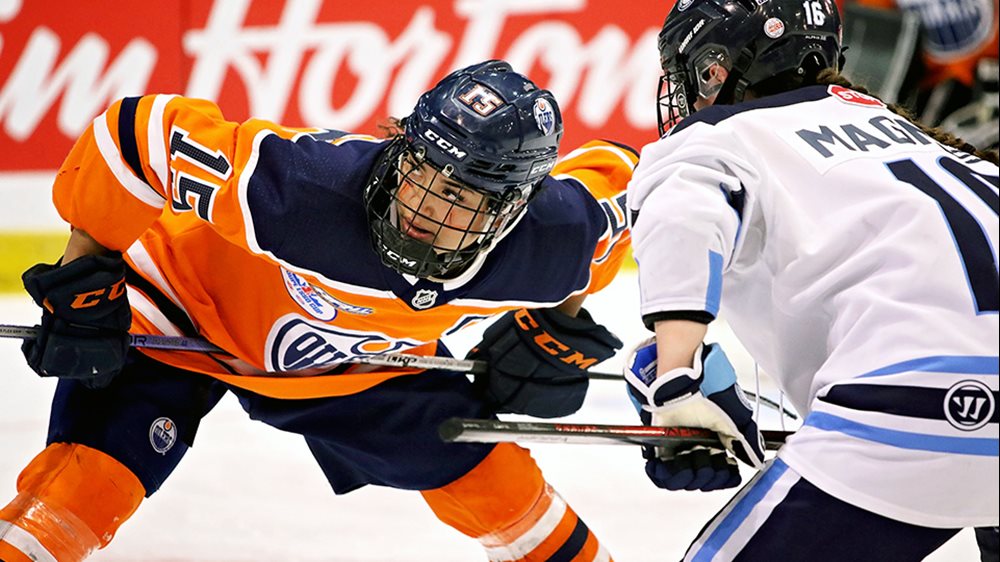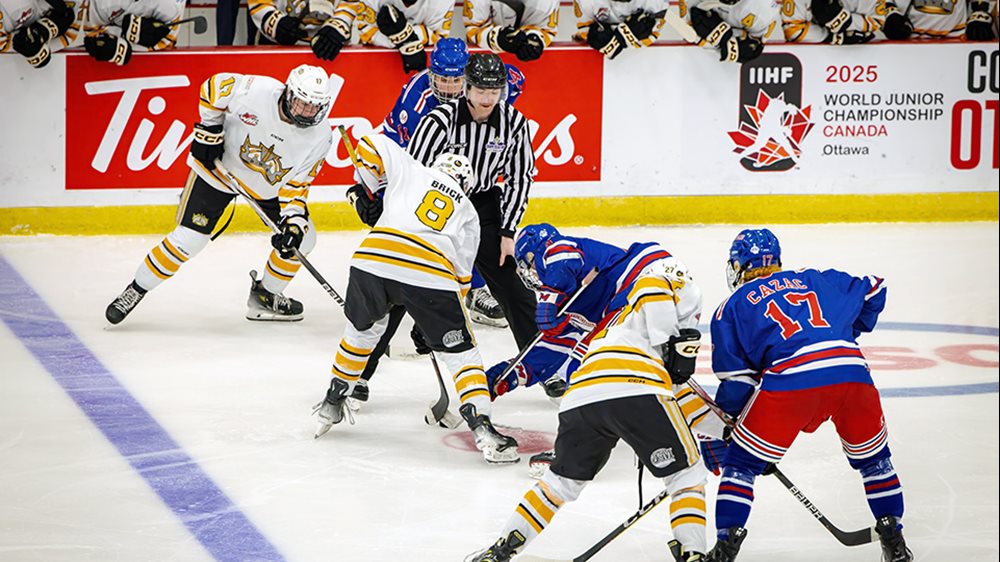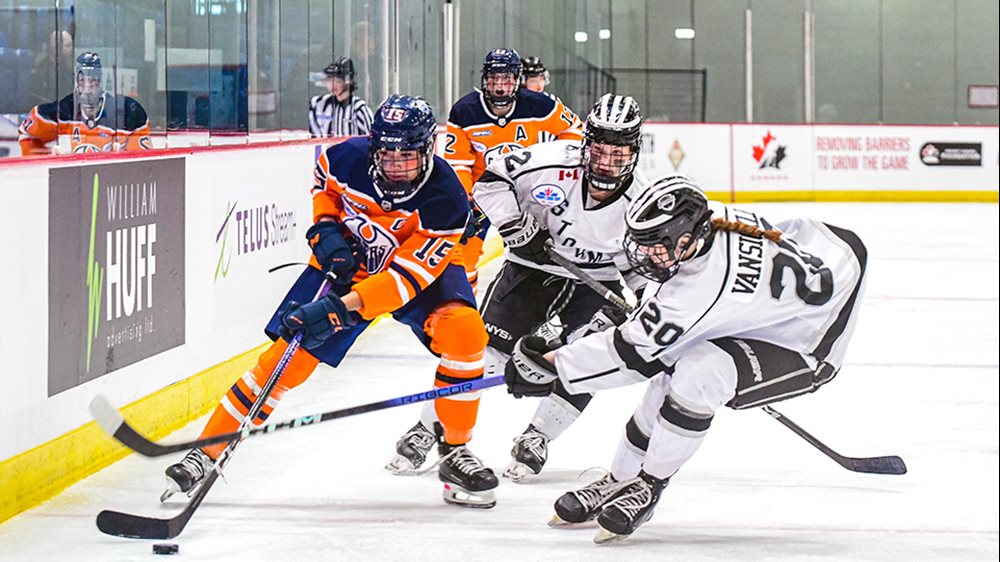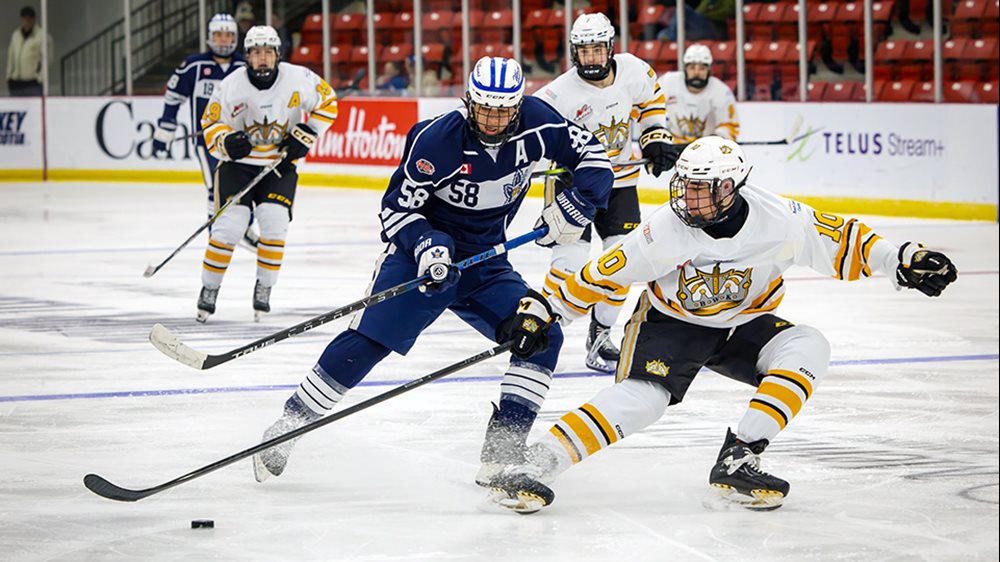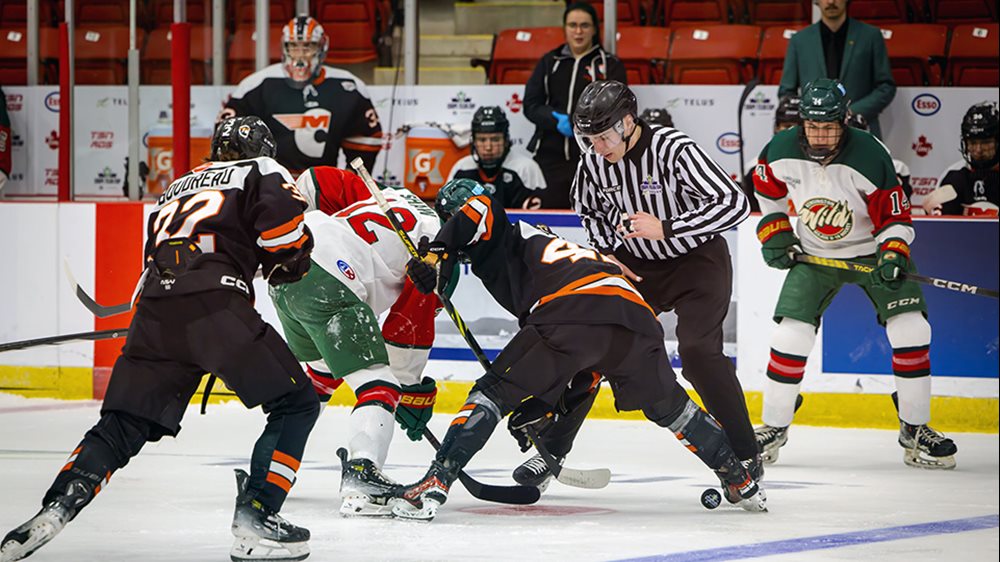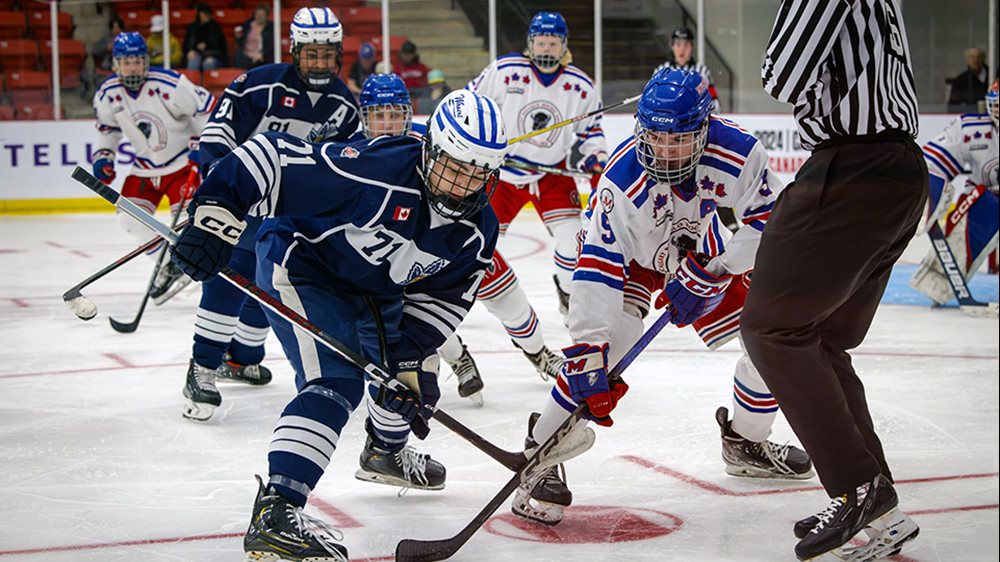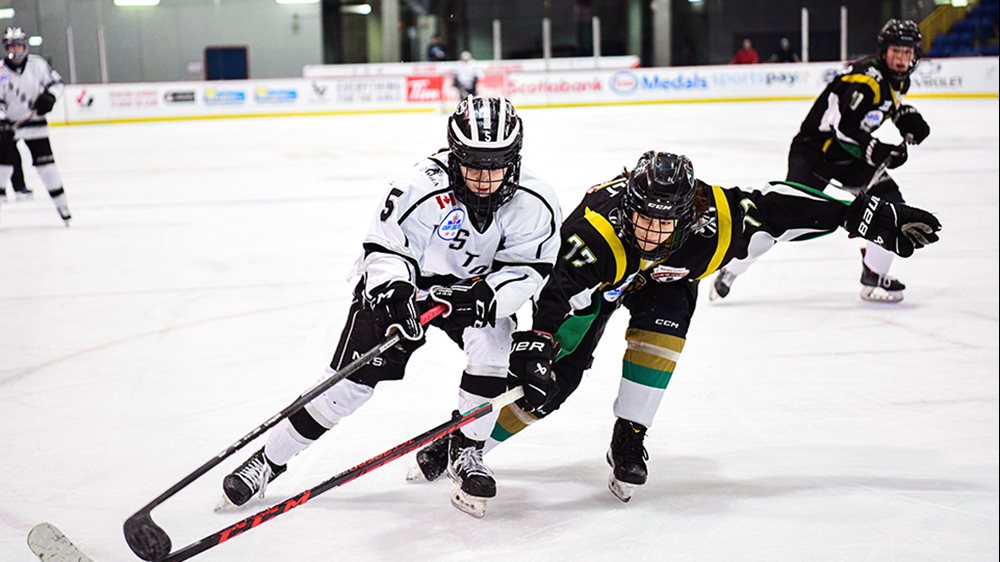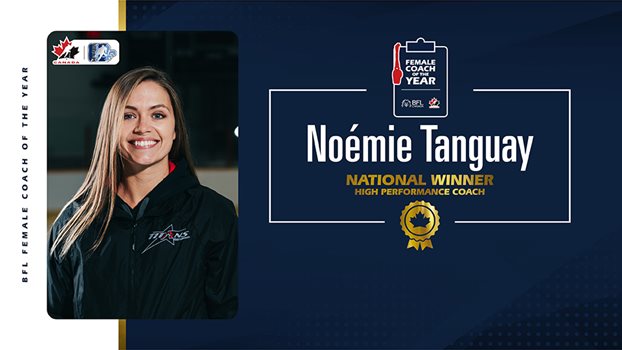
Right where she belongs
Armed with playing experience, education and a passion for helping players develop, Noémie Tanguay has found success behind the bench
“I’m a players’ coach who makes you feel good about yourself, and that on the ice is where you belong.”
That’s how Noémie Tanguay describes herself when asked about what kind of coach she believes she is.
This human approach is not only a source of pride for the young coach, it is also the basis of all her teaching as an assistant with the Titans du Cégep Limoilou.
“Whenever the players have difficulties, they know that my door is always open. I am a non-judgmental person in life, so they feel they can confide in me," says Tanguay. "It’s such a pivotal time [in their lives], these are ages where they’re discovering themselves as people, and I think it’s so important to offer them a shoulder to lean on, other than their parents.”
To fully understand why Tanguay values this approach so much, one must first understand her background in hockey. Growing up, the girls’ hockey programs available to her were not as developed as they are today. She had to play with the boys up to the U15 level before joining AA girls’ organizations in the Chaudière-Appalaches region. She then played in the Limoilou organization from 2011 to 2014.
In the Tanguay family, hockey has always been a family affair. Noémie’s older brothers, Maxime and Frédéric, have both played at competitive levels. Their father, Stéphane, would travel to arenas across the province to cheer on his children when he wasn’t behind the bench coaching. The constant presence in the stands of their biggest fans, mother Marcelle and sister Véronique, was always a source of comfort for everyone.
“I was often the only girl on the ice, so if I didn’t have them behind me, I probably wouldn’t have continued [playing],” Tanguay says. "My dad coached me for a few years and he’s always been involved in his community. It will four years since he passed away from brain cancer on June 17, but he still inspires me a lot. I definitely wouldn’t be where I am without him and my mom, brothers and little sister, who have always been my number-one supporters."
After winning three provincial championships in as many years with the Titans, including two as captain, Tanguay put an end to her playing career to jump behind the bench as an assistant coach. Under her tutelage, the team has won four of the last five provincial titles.
While the success was instantaneous, her coaching debut was not without its challenges. First, there was the closeness the Titans alum had with many of the young women she was now coaching.
“There were girls on the team that I had played with for one or two years," Tanguay recalls. "Whether you like it or not, by becoming a coach you’re definitely going to break your friendship with them in a way. I found that really hard. But I knew it was something that was normal if I wanted to make sure I had their respect and made my transition smooth.”
But the challenges didn’t end there. The Titans’ successes were intimately tied to the recruitment of players who came in with increased skill and talent as the years went by.
“As a former captain, I had a good understanding of what it took to get the team moving in the right direction year after year," Tanguay says. “But the girls coming in [to our program] today are so good on the technical side that sometimes I feel like I can’t help them with much on that level.”
“I think I’m a good coach because I’m articulate and I’m always positive. But I’m not a great technician on the ice – I’ve never been the best player – so I think it’s more my human side that sets me apart.”
Élizabeth Giguère, a U18 worlds silver medallist and Team Canada alumna who played under Tanguay with the Titans, is quick to agree.
“Noémie may say she doesn’t have the best technique, but you don’t have to be able to do everything yourself to teach it,” Giguère acknowledges. “The kids loved her so much because she gave them a lot of tips.
“She was someone I wasn’t afraid to talk to. She’s approachable, and I think that’s really her greatest quality. To approach her for advice and walk away with an answer every time is something I really appreciated about her.”
Seven seasons into her coaching career, Tanguay is not shy admitting she is still learning. Although the experience she has accumulated over the years will always help her refine certain aspects of her job, her education also plays a big role.
“In addition to my background as a player, I took a lot of courses as part of my bachelor’s degree that opened my eyes so much,” she says. “Not just with ethics and fairness in sports, but also with everything from sports psychology, harassment in sports, doping. These are all things that I am able to touch on and things that I read a lot about. That’s where I think I come in to make a contribution to the team. I would say that’s my primary strength.”
Through her studies, her own experiences and the different coaching courses she takes every year, Tanguay is always looking to improve. And always looking to ger her players talking.
This approach, which relies on human contact, interaction, transparency and honesty, makes her a coach who is not only respected, but adored by her players. For Giguère, it is no surprise Tanguay was named the national winner of the BFL Female Coach of the Year award in the high-performance (now referred to as Competitive) category.
“She was just starting out as a coach with me and I thought she was already good,” Giguère says. “With her charisma, the way she approaches people, the way she talks to others and the smile she always has on her face, she makes it fun to come to the arena and work with her.”
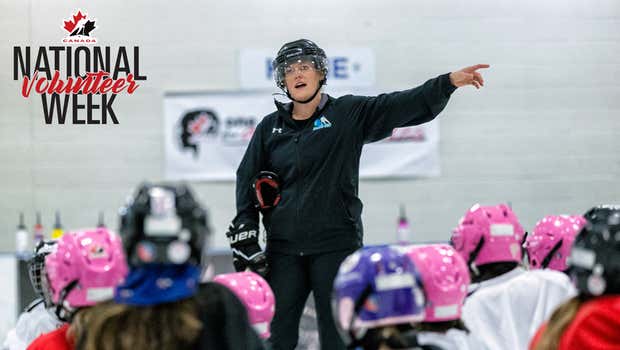
Making an impact in the North
A game-changer in women’s hockey, Kaylee Grant tirelessly gives her time across the territories, volunteering to ensure opportunities exist for women and girls
The first thing Kaylee Grant did when she moved to Yellowknife was find a hockey team.
The operating engineer took a one-year term to gain experience in her industry. Twelve years later, she’s still in the Northwest Territories and hockey has been a reason why she calls it home.
“You gravitate to what you know, and I knew sports,” Grant says. “When you join a sport, you instantly have 17 friends and a group where you feel accepted through a common goal and interest. When I moved to the North, I didn’t know how else to meet friends, so I went to the rink right away.”
Grant grew up around the rink in Antigonish, Nova Scotia. The community was also a hockey hotbed, supporting its Junior A, Junior B and university teams. Being around that passion and community made hockey an important part of her life.
“Playing hockey is what we did,” Grant says. “The community rallied behind our teams and the rinks were full, the atmosphere was great, and hockey was so prominent.”
She played minor hockey in Nova Scotia before moving to Newfoundland and Labrador to play at Memorial University. At 23 years old, she made the move to Yellowknife and knew she would find her community inside a rink.
“I find that the easiest thing to do when you come to a new place to meet people is through sport,” she says. “With joining a hockey team, I was already creating a group of people that were like-minded in interests and similar age. Plus, there are so many opportunities in the North to grow as coaches, players and mentors that have been so helpful.”
Grant’s love for the game wasn’t just as a player—she expanded her knowledge
by getting into coaching while in Nova Scotia. She started as an off-ice
coordinator with the Antigonish Bulldogs women’s under-18 team.
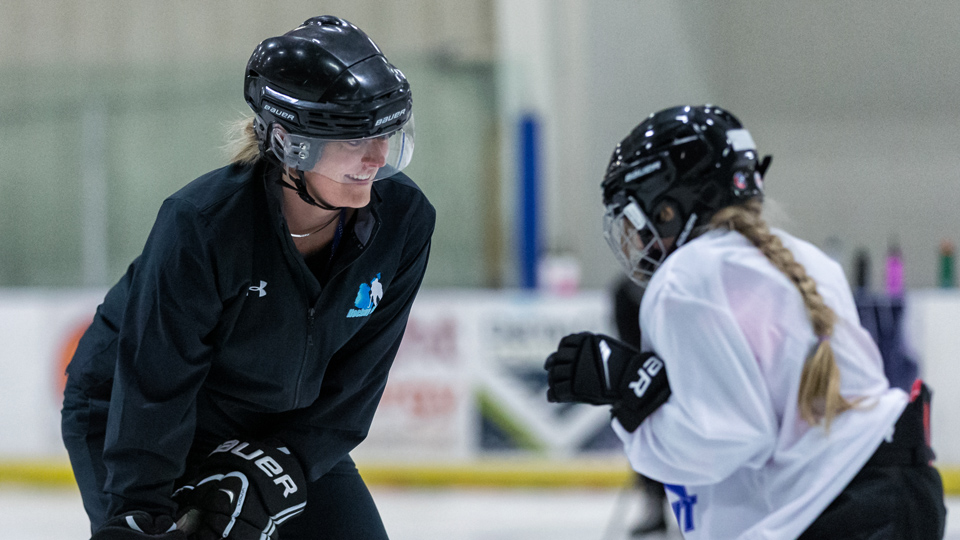
She did her Coach Development 1 training before getting her High Performance 1 training and evaluation certification. She continued to pursue additional coaching certification and training over the years to educate herself and give back to her community.
“I think seeing the female game continuously grow and develop that keeps me interested,” Grant says. “I love to see the progress in my players. I love seeing these players grow and adapt as individuals. Seeing them get involved in coaching is the coolest part.”
Her coaching philosophy is to develop a player’s passion for the game, be a role model and create an environment that is positive for women and girls.
Coaching and mentoring young girls are important to Grant, and she saw that path was through high-level opportunities, particularly by becoming a facilitator to drive more players into the coaching route. She has been working with Hockey North and the Hockey Canada Women Master Coach Developer program, which is focused on removing barriers to coaching education for women.
“Kaylee has volunteered at pretty much every level and she’s getting more involved with training coaches and being a clinician, which is an amazing progression for her,” says Kyle Kugler, executive director of Hockey North and a close friend of Grant. “She’s a great ambassador for hockey by giving back to other coaches through her experiences and helping with their development.”
Through being a volunteer coach, Grant has been able to experience some highlights with her teams, including as head coach for the Arctic Winter Games and Canada Winter Games, and as an assistant coach for Team North at the National Aboriginal Hockey Championship.
“Hockey North has given me so many opportunities and having that support has impacted me as a coach,” Grant says. “I enjoyed every year with those territorial teams and those experiences are a very big reason why I stay here – the coaching opportunities and knowing that we continually have room to grow.”
Another event that Grant was a key volunteer for was the inaugural One For All festival held in Yellowknife in February. It was a four-day event for women and girls from across the N.W.T. and Nunavut that included goaltending clinics, on-ice scrimmages and other off-ice experiences. The event was launched in partnership with Hockey Canada and Hockey North to celebrate the sport and grow grassroots hockey in the North.
“Kaylee is one of our co-leads in the North, and when we set out to deliver this programming in Yellowknife, it was a no-brainer that she would be involved. And typical Kaylee, she just runs with a task and completely owns it,” says Katie Greenway, manager of women’s and girls’ hockey with Hockey Canada. “To have champions like Kaylee that dedicate themselves to their community and sport is so important.”
Giving back through coaching is just what Grant does—it’s like a hobby for her and she does it for others and to see more women in the sport, not for what it could bring to her.
“I’ve known Kaylee for a few years now and she has so much on her plate, but she never says no,” Greenway says. “She doesn’t do it for the accolades, but out of the goodness of her heart with a smile on her face. She’s fantastic and is really impacting everyone that she comes across.”
Grant’s impact on hockey in the North has been felt by many of the girls she has coached, mentored and played with over the past 12 years, but it’s the bigger picture that is most important to her.
“I’m not going to say that myself, individually, has drastically impacted female hockey in the North. I think I am a very small portion of what’s been going on in the North in the last 10 years,” Grant says. “I would like to think that I have helped develop more female coaches and I’ve been a good role model. I think if I have impacted hockey in the North, its pushing players to want to coach a little bit, but it’s a collective—everyone has left their mark on the female game.”
For Kugler, as the lone administrator for Hockey North, having volunteers like Kaylee is so critical to the work and development of hockey players.
“I think volunteers are essential for the delivery of anything in small communities in the North,” he says. “[Kaylee] takes on more than we even realize. Coaches have a huge influence on teams and athletes and she’s a positive role model and advocate for female hockey. She’s selfless with her time and she’s just an awesome person.”
Interested in becoming a coach? Visit HockeyCanada.ca/Coaching, or contact your local hockey association or Hockey Canada Member for more information.
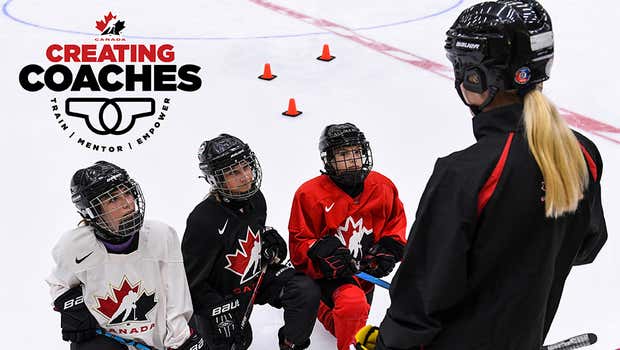
Eight student-athletes to participate in Creating Coaches program
Creating Coaches’ third cohort runs until end of 2024-25 season
CALGARY, AB – Hockey Canada and U SPORTS have announced the eight student-athletes who have been selected to join Creating Coaches, a program designed to increase the number of women coaching hockey in Canada, as part of its third cohort which will run during the 2023-24 and 2024-25 seasons.
Launched in 2021 through a partnership between Hockey Canada, U SPORTS and the Hockey Canada Foundation, Creating Coaches provides training and mentorship to current U SPORTS student-athletes who are concurrently looking to begin their coaching careers. Participants in the program serve as an assistant coach with a U13, U15 or U18 girls’ hockey team for the duration of the two seasons and receive coach education, professional development opportunities and an honorarium.
This year’s cohort includes student-athletes from eight U SPORTS women’s hockey programs across three of its conferences:
• Alexis Anonech (York University, OUA)
• Emmy Fecteau (Concordia University, RSEQ)
• Lyndsey Janes (Mount Royal University, CW)
• Madison Laberge (Nipissing University, OUA)
• Isabelle Lajoie (University of Alberta, CW)
• Sophie Lalor (University of Saskatchewan, CW)
• Sarah-Maude Lavoie (McGill University, RSEQ)
• Chihiro Suzuki (Guelph University, OUA)
“We are thrilled to welcome these eight accomplished student-athletes to Creating Coaches and look forward to working with them during the next two seasons,” said Marin Hickox, Hockey Canada’s vice-president of women and girls’ hockey. “Creating Coaches is an important program to support and develop hockey’s next generation of leaders and we are grateful to the U SPORTS coaches who nominated this talented group.
“Girls who have been coached by a woman are more likely to transition into a coaching role at the end of their playing careers, and it is our intention that this program will positively influence the recruitment and retention of girls and women in leadership roles in the sport.”
Since its inception, Creating Coaches has included student-athletes from 16 U SPORTS women’s hockey programs and all four of its conferences.
“The eight student-athletes selected to join Creating Coaches are tremendous ambassadors for hockey and university sport in Canada,” said Lisette Johnson-Stapley, chief sport officer at U SPORTS. “We have already seen the positive impact that this program has had inspiring young girls in communities across the country and we are excited for Alexis, Chihiro, Emmy, Isabelle, Lyndsey, Madison, Sarah-Maude and Sophie to begin their coaching careers while continuing to represent their universities with pride as student-athletes.”
The Creating Coaches selection committee includes representation from Hockey Canada, U SPORTS, Hockey Canada’s Members and the Hockey Canada Foundation Board of Directors.
During National Coaches Week, Hockey Canada is celebrating the positive impact that coaches have on athletes in communities from coast to coast to coast, with #ThanksCoach resources and features shared here.
To learn more about Hockey Canada, please visit HockeyCanada.ca, or follow along through social media on Facebook, X and Instagram.

2022 BFL Female Coach of the Year winners announced
22 recipients selected across Community, Competitive and High Performance categories
CALGARY, Alta. – In partnership with BFL CANADA, Hockey Canada has announced the national and provincial/territorial winners of the 2022 BFL Female Coach of the Year Award, which recognizes coaches who led by example in demonstrating fair play and a commitment to the development of every player and staff member, and made significant contributions to the game during the 2021-22 season.
Nominated by parents and players from coast to coast to coast, three national and 19 provincial and territorial award winners were chosen by the selection committee, which included Olympic gold medallists Cassie Campbell-Pascall, Gina Kingsbury and Caroline Ouellette, Teal Gove of Hockey Canada and Sacha Vaillancourt, vice-president and national practice leader of sports and leisure with BFL CANADA.
Sarah Hilworth, the head coach of the women’s hockey team at the University of New Brunswick, earned the national award in the High Performance category and will receive a $5,000 bursary and an invitation to Canada's National Women's Team camp this summer. Since joining the Reds, Hilworth has consistently demonstrated the importance of sportsmanship, empowered her players to make a difference on and off the ice and contributed greatly to her community.
Laurence Beaulieu and Amy Doerksen are the national winners in the Competitive and Community categories, respectively, receiving a $2,500 bursary and Hockey Canada merchandise package.
A former professional hockey player with the Canadiennes de Montréal, Beaulieu’s coaching career began five seasons ago. Through her passion for the game, the Titans du Cégep Limoilou assistant has already made a name for herself behind the bench.
As a Timbits U7 coach in Brandon, Man., Doerksen has gone above and beyond to create a positive hockey experience, while providing a safe and inclusive environment for all participants. Additionally, she has emphasized the importance of having fun through organizing team activities and special events for her local hockey association.
In addition, 19 provincial and territorial award winners were recognized and will each receive a $1,000 bursary.
Winners in the Competitive category included: Mandy Layden (Alta.), Brittany Kirby (B.C.), Tess Houston (Man.), Abby Clarke (N.B.), Grace Hatcher (N.L.), Josanne Deveau (N.S.), Stephanie Pascal (Ont.), Rebecca Babiak (P.E.I.) and Tori Spencer (N.W.T./Y.T./Nvt.).
Winners in the Community category included: Lesley Burton (Alta.), Heather Neale Furneaux (B.C.), Katie Peddle (N.B.), Monique Organ (N.L.), Erin Crowell (N.S.), Kiara Jefferies (Ont.), Nadine Moore (P.E.I.), Laetitia Létourneau (Que.), Barb Bryden (Sask.) and Jessica Cox (N.W.T./Y.T./Nvt.).
For more information on Hockey Canada, please visit HockeyCanada.ca, or follow along on Facebook, Twitter and Instagram.
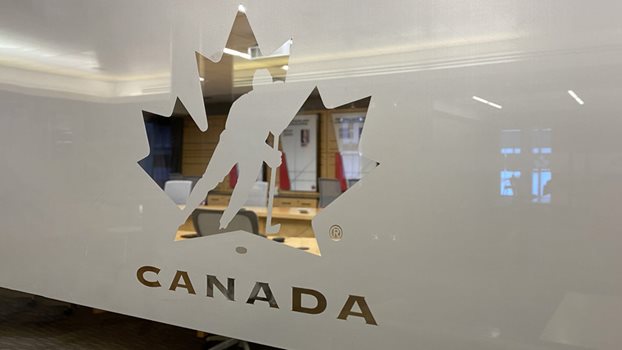
Hockey Canada adds two key staff
Natasha Johnston named director, sport safety; Marin Hickox hired as director, women and girls hockey
CALGARY, Alta. – Hockey Canada has announced that prominent Canadian sport executives Natasha Johnston and Marin Hickox have joined the organization to lead its strategies in safe sport and women and girls hockey, respectively.
“We are thrilled to welcome Natasha and Marin to Hockey Canada in these brand-new positions that focus on advancing two key strategic areas of our organization,” said Hockey Canada president and chief operating officer, Scott Smith. “They both have invaluable experience from across the sport industry and will both play critical roles to ensure hockey is a safe and inclusive sport for all participants.”
As director of sport safety, Johnston will oversee Hockey Canada’s safe sport portfolio, which includes developing sustainable solutions to address player safety and maltreatment. Johnston will also work with Hockey Canada’s 13 Members to deliver strategic initiatives that promote inclusion and provide participants from coast to coast to coast with positive hockey experiences for years to come.
Most recently the executive director of Ringette Canada, Johnston contributed to the Universal Code of Conduct to Prevent and Address Maltreatment in Sport as a national representative, and previously held progressive roles with the Canadian Centre for Ethics in Sport and Football Canada.
Hickox will lead the organization’s recruitment and retention efforts that support the continued sustainability of women’s and girls’ hockey programs across Canada, and drive a collaborative approach to increase the number of women in key roles within the hockey ecosystem, including in leadership, coaching and officiating.
In 2020, Hickox was a member of the women’s hockey task force for the inaugural Elite Women’s 3-on-3 game as part of National Hockey League (NHL) All-Star Weekend. The former Maple Leaf Sports & Entertainment and NHL marketing executive has also consulted for the Professional Women’s Hockey Players Association.
Johnston and Hickox have started their new positions with Hockey Canada, working from Ottawa and Toronto, respectively.
For more information on Hockey Canada, please visit HockeyCanada.ca, become a Hockey Canada Insider, or follow along on Facebook, Twitter and Instagram.

Leading the growth of para hockey
As a veteran Canadian para hockey player, Dr. Peggy Assinck’s goal is to grow the sport internationally and ensure women have a chance to play the game she loves
Growing up, Dr. Peggy Assinck was very athletic. She was not yet identified as being born with spina bifida—a congenital defect of the spine—so she was entirely able-bodied and played a variety of sports.
That’s why when she experienced complications from her condition and became paralyzed from the waist down at age 11, she felt like she lost a bit of her identity.
“It was really difficult to be honest with you, because I think I really self-identified as an athlete,” Assinck, 38, says. “My parents really wanted to find a way to have me be involved in sport, despite the fact that I was dealing with ongoing medical and paralysis-below-my-waist issues.”
A recreational therapist recommended she try one of the only adaptive sports near Peterborough, Ont., at that time: para hockey. Assinck and her family travelled 90 minutes away from home to try the sport for the first time. Although it wasn’t necessarily love at first skate, she was thrilled to meet other kids just like her.
“Because I grew up in such a remote community, I'd never met anyone else in a wheelchair or anyone else using adaptive equipment,” she says. “That was pretty cool just to meet other disabled kids.”
With time, her passion for para hockey grew and flourished. Now one of the veterans with Canada’s national women’s para hockey team, Assinck’s goal is to ensure other women and girls around the world have an opportunity to try the sport she has dedicated her life to.
Ensuring positive experiences for women
One thing Assinck emphasizes is ensuring positive experiences for women when they try para hockey for the first time. As the women’s team holds its selection camp in Yellowknife, N.W.T., from April 25-30, a grant from the Hockey Canada Foundation will assist with providing try-it opportunities and grassroots sessions in the community.
“I want to make sure that more kids and more people who sustained new injuries are getting a good first-contact experience,” Assinck says. “I think the Hockey Canada Foundation grant really helps for the women’s para hockey team to do that in remote communities [and] to help support female-specific programming.”
We believe as a Foundation that girls grow when they play hockey and hockey grows when girls play,” says Alexandra Wise of the Hockey Canada Foundation.
“Working with an organization like Women’s Para Hockey of Canada is something that allows us to align our missions and keep developing the game from a grassroots level, but then also at a higher level," Wise adds.
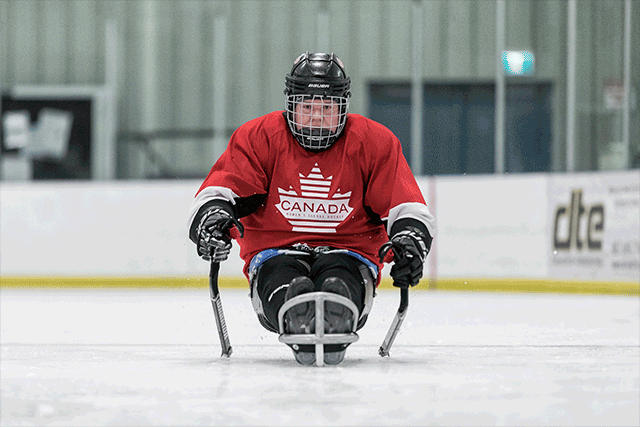 It’s no coincidence that wherever Assinck has gone in her life, women’s
para hockey has grown with her guidance and support. Inspired by wanting to
learn more about spina bifida, she attended Brock University to pursue a
neuroscience degree. As she completed her undergraduate degree, she played
with the Niagara Thunderbirds and volunteered with the Brock Niagara
Penguins, a sporting program for youth and young adults with a physical
disability.
It’s no coincidence that wherever Assinck has gone in her life, women’s
para hockey has grown with her guidance and support. Inspired by wanting to
learn more about spina bifida, she attended Brock University to pursue a
neuroscience degree. As she completed her undergraduate degree, she played
with the Niagara Thunderbirds and volunteered with the Brock Niagara
Penguins, a sporting program for youth and young adults with a physical
disability.
Upon her graduation in 2008, Assinck began her master’s degree and completed her PhD in neuroscience at the University of British Columbia. Looking to continue training as an elite para hockey athlete, she searched for a club team to join in her new home province.
“After growing up in southern Ontario, where para ice hockey was everywhere, I was quite surprised at how little para ice hockey was in British Columbia as a whole,” she says.
Once she joined a team based out of Surrey run by SportAbility, Assinck helped to create new para hockey programs in Vancouver and Victoria, and aided in making opportunities across the province to try the sport. From there, she helped to organize a provincial team with support from BC Hockey.
Traveling across the pond
A postdoctoral fellowship took Assinck overseas in 2017 to the University of Edinburgh and the University of Cambridge. There were a handful of club programs in Great Britain when she moved, and the Canadian quickly joined the closest team to her—the Manchester Mayhem—to continue training.
“I’ve been participating as an athlete on that club team for a while, but I think it became pretty clear that I had a lot of expertise in para hockey, and I got asked about a year into playing here to join as the assistant coach on [Great Britain’s] men’s para ice hockey team,” she says.
Assinck traveled with Team Great Britain to the IPC World Para Hockey Championship, B Pool, in 2019 in Germany.
“I think I was probably the only athlete who was also a coach, I was probably the only female who was also a coach,” she says. “It was a really amazing opportunity to just be on the bench and to help to support the men’s program in what they were doing and in their goals.”
With the addition of coaching on her résumé, a new opportunity presented itself in 2021: the International Paralympic Committee approached the coaches of Great Britain’s men’s para hockey team to ask if they would create a women’s team.
I suddenly found myself with the opportunity to create a team in another country… and it just seemed like the right space for me,” Assinck says.
Assinck quickly got to work. She put out a call for athletes with lower-body disabilities living in Great Britain, interviewed potential players and selected 27 athletes —most of whom had never played para hockey before—for the new program.
Although Assinck was leading the charge overseas, she continued to receive support from Team Canada staff back home. One of the difficulties she encountered was a lack of ice time, meaning she was often teaching a group of athletes how to play hockey without being on the ice.
“She’s spending time in classrooms teaching them the basics of hockey,” says Tara Chisholm, head coach of Canada’s national women’s para hockey team. “She’s renting out gymnasiums so they can do floor hockey and learn about systems that way. She’s literally pulling everything she can together to teach these athletes how to be hockey players in a space that really is not intended to flourish for hockey players.”
Despite the limited resources and the challenges of creating a new team during the COVID-19 pandemic, the newly formed Great Britain national women’s team is prepped to compete at its first international event, the IPC Women’s World Challenge, this fall.
“I honestly do not know how she does everything that she does,” Chisholm says. “I’m very grateful for all the work that she has done that goes unnoticed and that has essentially helped to develop women’s para hockey to where it is right now.”
Growing the game in Canada and beyond
As she created the team, Assinck put together a document of how she kickstarted the program with the goal to share it with other countries so they can replicate the processes.
“That is the big goal right now, to not only grow the game within our borders of Canada, but then to make sure that other girls and women with disabilities across the world have the opportunity to play the sport of hockey,” Chisholm says.
“In order to be in the Paralympics, we need more countries to create teams,” Assinck adds. “We just want to make sure that they have a great first experience and that we’re creating a sustainable program that can continue for many, many years.”
I’m a true believer that if I hadn’t been involved in [para hockey] when I was young, when I was going through the struggles that I had, I wouldn’t be the person I am today,” Assinck says.
Although it’s a bit of an odd position to play against the team you created in competition, Assinck had the full support of her British colleagues to return to Canada and prepare for the Women’s World Challenge. Despite everything she has done to grow the sport, she still prioritizes being the best athlete she can be and she trains hard to earn the privilege of wearing the Maple Leaf on her chest.
She hopes people see her as someone who has dedicated a lot of her life and finances to being an elite athlete, and someone who has gone over and above to support women and para hockey in Canada and around the world. It’s the least she could do for a sport that has changed her life.
“I’m a true believer that if I hadn’t been involved in [para hockey] when I was young, when I was going through the struggles that I had, I wouldn’t be the person I am today,” she says. “I wouldn’t have the confidence to be up speaking in front of thousands of people about neuroscience or even the confidence to be able to be jumping around from team to team in some of my coaching roles.
“I’m hoping that I can look back and feel like I did everything I possibly could to make sure that people with disabilities, particularly women with disabilities, are getting exposure to the sport that means so much to me and could mean so much to them.”
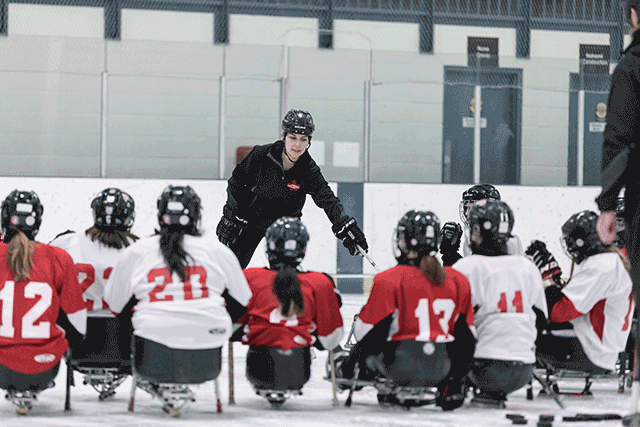
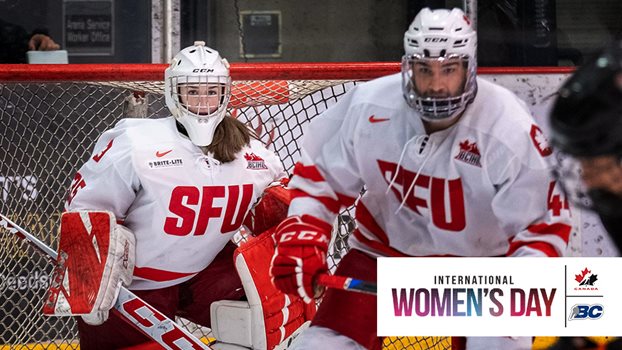
Munro finds her hockey home
The COVID-19 pandemic changed Kayla Munro’s post-secondary plans, but the goaltender landed on her skates at Simon Fraser University, making a little history in the process
The past two years have been anything but normal for Kayla Munro. Like many athletes, the young goaltender’s daily life was shaken up by the global pandemic, as seasons were cancelled and restrictions were put in place. The challenge to find avenues to be able to play hockey became difficult.
For Munro, her journey to continue to play hockey has led her to the unique path of joining the Simon Fraser University (SFU) men’s hockey team. The result has been a talented young hockey player being able to continue in the sport while breaking through barriers.
“I didn't know if I was going to get to play hockey again,” says Munro. “I am just grateful right now to be playing on the SFU team.”
SFU and Munro had a fantastic 2021-22 British Columbia Intercollegiate Hockey League (BCIHL) regular season, going undefeated with a perfect 12-0-0 record. For Munro, she made history throughout the season. She first jotted her name into the BCIHL history books as the first woman to ever play in a league pre-season game on Sept. 25, 2021, when she entered in the third period to take the net versus the Okanagan Lakers. She had a solid outing, stopping 13 of 14 shots in the frame. Munro next made her mark on Oct. 16, 2021, when she became the first woman to start a BCIHL exhibition game, also against the Lakers.
“I was a little bit nervous,” Munro says of seeing her first game action. “Honestly, I hadn't thought about it as being a big milestone. I was nervous because I hadn't played a game in about two years. Last year at Syracuse and the year before that I had shoulder surgery. I talked to a sports psychologist and have learned some really good ways to control my nerves and make them a driving force of how well I play. Although a little nervous, I felt prepared.”
Munro’s crowning achievement, to this point, was on Feb. 5, 2022, when she became the first woman to ever play in a regular season BCIHL game. The 19-year-old took the crease for the third period against the Okanagan Lakers as SFU skated to an 8-5 victory.
For Munro, the original plan was not to rewrite history as a member of the SFU men’s hockey team, in fact it was far from it. Her goal was to play NCAA hockey, and it appeared she had attained that lofty accomplishment when she committed to Syracuse University in New York on a hockey scholarship in 2019.
“It was honestly a dream come true to get the scholarship to Syracuse,” says the product of North Vancouver, B.C. “It had been my goal to play in the NCAA since I started playing hockey. In my opinion, other than the Olympics, it is one of the highest levels you can get for female hockey.”
However, as the world locked down and sports changed, so did Munro’s plans as she chose to stay home with family and not play south of the border. The decision was not easy but was met with support and understanding.
“I went to Syracuse for about a month in 2020,” says Munro. “We couldn't practice or do anything; we were just stuck in our apartments. For family reasons, I decided to come back home. Originally it was just for a semester, but then I decided just to stay home. [Syracuse head coach Paul Flanagan] was supportive. He is an amazing guy. He wants the best for you, and he told me that he wanted whatever made me happy and what was best for my mental health.”
Once Munro decided to stay home in British Columbia, she was left looking for a university to continue her studies. Additionally, she was hoping to find a place to play hockey, a difficult task given all of the restrictions in place associated with the pandemic.
“I applied to Simon Fraser University and was accepted,” says Munro.
With her schooling plans secured, she began looking at hockey options.
“I began looking at everything. Even if they had an intramural team or house league, I just wanted to keep playing.
“I found that SFU had a men’s hockey team and so I emailed [head coach Mark Coletta] asking if I could try out. I told him a little about myself, the teams I played on and the level that I've gotten to in hockey. He was really supportive right away.”
“Kayla needed a spot to play,” says Coletta. “I let her know that she was more than welcome to come try out, and if you're good enough to play, you’ll play. Given her predicament, we wanted to give her a shot.”
The tryout for Munro was successful and after a training camp, she was included on the 2021-22 roster for SFU.
“She can play hockey,” adds Coletta. “She's technically very good between the pipes, she moves around very well. So, making sure she adapts well is the important thing.”
Coletta was clear that Munro made his squad on the merits of her play. He views her as a hockey player, with no designation of gender.
“Kayla’s a tremendous person,” he says. “She's proven every day that she comes ready to work and play.”
Not being treated any differently is something Munro has valued from Coletta.
“He believes that the best players should be on this team,” says the goaltender. “It doesn't matter if you’re a girl or a guy. The first time when we talked on the phone, he said that I was just an equal hockey player, no more or no less. I found that very rewarding and empowering, and it made me feel really good.”
Over the years, Munro has had many positive influences that have helped her as a player and person. While she was with the North Shore Avalanche of the North Shore Female Ice Hockey Association, Munro was first introduced to Jeff Eaton.
“I have two coaches that have stuck with me,” says Munro. “(Eaton) coached a lot with the North Shore Avalanche, came out and did skills with us. Eventually, I got to play for him with the [Pacific Steelers Junior Female Hockey Club]. He's just one of the most knowledgeable hockey people that I know, and so supportive. Coach Eaton just wants to see us succeed and he was the biggest reason why I got my scholarship to Syracuse. I learned a lot of really good things from him.
“The other coach was Delaney Collins. She coached me on the [U18 AAA] Fraser Valley Rush my first year with the team.”
Collins, a fixture on defence with Canada’s National Women’s Team during the 2000s, transitioned her 95 appearances and nine gold medals with the national team into coaching. Collins brought an impressive resume to coaching but also left Munro with a lasting message.
“(Collins) is a big believer in women being empowered,” says Munro. “That we should be considered equal, not just in sports, but everything. I learned from her how to be a confident woman. That it's okay to be strong and have muscles, and not just be dainty and delicate. She helped me find who I was as a goalie and a person. She was a really big role model for me.”
“Kayla was an amazing individual to work with,” recalls Collins. “Her leadership and energy were infectious, and her teammates could count on her to always compete. As a goalie, she was extremely athletic, quick and her puck play was similar to a defender. She is fun to coach and is a great person and role model for young girls.”
After everything Munro has experienced over the last two years, she is well aware that plans can change quickly. However, going forward, the young goaltender has set some goals.
“I want to finish my schooling,” she says. “That’s very important to me. So, for my future, it is continuing my schooling and likely getting a job, while hopefully playing hockey. Honestly, I am grateful to be playing because there was a point I didn't know if I was going to get to play hockey again.”
Munro’s time with SFU will serve her well in the game, and additionally to help build life skills.
“This has been an adjustment for her,” says Coletta. “For Kayla to be able to adapt, I think it will serve her well once this year is over.
“She's worked hard and made a commitment to us. She was ready to play a lot of minutes or play the backup role. Anything to prepare herself for a spot as a starting goalie somewhere next year, whether it's back on the female side or not.”
Through it all, Munro has stayed strong through the challenges.
“During the last few years just staying motivated was my biggest challenge,” she says. “But I'm extremely happy where I am today. I'm very proud.”
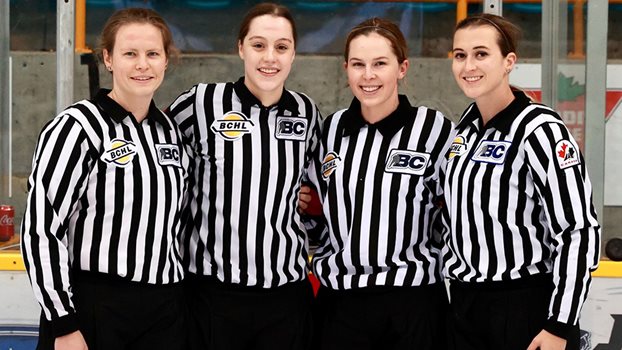
History in black and white
On World Girls’ Ice Hockey Weekend, the B.C. Hockey League played host to the first-ever all-female officiating crew for a Junior A game
It was just another night on the job for Grace Barlow, Melissa Brunn, Colleen Geddes and Megan Howes, but it marked a historic step forward for women in the officiating world.
The quartet became the first all-female officiating crew in Junior A hockey history on Sunday, Oct. 17, working the Langley Rivermen vs. Surrey Eagles game in the British Columbia Hockey League (BCHL).
All four – Barlow and Howes are referees, Geddes and Brunn are linespersons – are products of the Hockey Canada Officiating Pathway, having worked their way from their local hockey associations through the B.C. high-performance program.
“The success these officials have achieved is a testament to their perseverance and dedication to their craft,” says Dan Hanoomansingh, manager of officiating with Hockey Canada. “Yes, it’s a history-making night, but with the work being done at the Member level, the hope is this becomes commonplace in the not-too-distant future.”
While Barlow and Geddes are making their BCHL debuts this season, Brunn and Howes have a few games of Junior A experience under their belts, including working a pair of exhibition contests featuring Canada’s National Women’s Team on Oct. 5 in Trail and Oct. 6 in Cranbrook.
“It was a little bit surreal,” Brunn says of working the Team Canada games. “Sharing the ice with some people that we've only ever seen on TV [was a new experience].”
Barlow, Brunn and Howes also got the call to officiate at the 2019 National Women’s Under-18 Championship in Morden and Winkler, Man., Barlow saw the ice at the 2019 National Aboriginal Hockey Championship and all four have experience in men’s and women’s hockey at various levels in the province.
“We know what's happening, we know the rules, we have a level of familiarity. We've done this a million times before,” Brunn says of how she approaches every game, regardless of the level.
The game in Surrey – which fell on the final day of World Girls’ Ice Hockey Weekend – is the latest in a flurry of news items highlighting the achievements of women in the officiating world.
Alex Clarke became the first female linesperson in Western Hockey League and Canadian Hockey League history on Sept. 24, and Kirsten Welsh earned that honour in the Ontario Hockey League on Sept. 30.
Clarke and Welsh also joined Elizabeth Mantha and seven American officials as the first women hired Oct. 11 by the American Hockey League, the second-best league in North American pro hockey.
It’s just the start, according to Hanoomansingh.
“A few years ago, we were celebrating when a single woman broke into a Junior A or B league. Now, we’re seeing multiple officials breaking those barriers at every level.
“Ultimately, we must target proportional representation of women in junior and professional leagues,” he says. “These women are still an anomaly and we should celebrate their accomplishments, but we must continue to create further opportunities for women to excel in officiating.”

Coaching for the future
Janelle Forcand is a dedicated coach for her players, and a supporter of women behind the bench
It all started with a text. Janelle Forcand was sitting by her friend’s pool in the summer of 2013 when she noticed a message asking if she would be interested in working at a week-long hockey school. She thought it sounded like a great job … for a week.
Eight years later, the Winnipeg native has been named the national winner of the BFL Female Coach of the Year award in the community category.
“As a hockey player, I never thought that coaching would be a thing. It never crossed my mind,” Forcand says.
Growing up in the Manitoba capital, Forcand says she was fortunate to play girls hockey throughout her career, even though it was following after her older brother, Scott, that motivated her to get into the game. A long-time member of the St. James Assiniboia Minor Hockey Association, Forcand didn’t crack the AA Titans roster until her final year of minor hockey.
In her early years behind the bench, Forcand worried that lack of high-level experience would be an important determination to coaching success. She has since learned the two aren’t directly correlated.
“Your hockey-playing background doesn’t translate into what your coaching ability can be,” Forcand says. “You can be a successful coach as long as you put the time, the effort and your heart into it.”
Forcand’s assistant coach, Danica Rowinski, says Forcand absolutely lives by that standard, and her players are better for it. Forcand will take her players rollerblading outside of team time or even come out for another team’s practice if a former player makes the request.
“The fact that the girls will reach out to her and she always pays so much attention to what is going on in their lives, I just don’t know many people like that,” Rowinski says. “She does things that she doesn’t need to do when she’s not working or coaching.”
Forcand is not only a positive influence in the lives of her players, but she’s also having an impact on the future of women in coaching. As the female hockey coordinator for the Winnipeg Jets Hockey Academy (a program designed to increase attendance in socially and economically challenged schools in Winnipeg), Forcand has been introducing young women to coaching by recruiting through her former league, the Manitoba Junior Women’s Hockey League.
“You don’t really have to think too far outside the box to get hockey players involved as coaches, but you just have to go out there and get them and expose them to it, otherwise hockey players won’t really think twice about it because all they’ve really know is being a player,” Forcand says.
While the approach seems like common sense, it’s that level of detail that Murray Cobb, director of the Academy, says sets Forcand apart from other coaches.
“Janelle has taken the time to research why girls are less likely to continue playing sports into their teenage years, and she goes above and beyond to ensure her players don’t fall into this statistic,” Cobb explains. “This goes a long way as an example to other coaches who see the wide variety of activities that Janelle brings to the rink and her players lives to make them want to keep playing hockey and staying active in general.”
Forcand has been the head coach of the U11 girls’ team at the Academy for three seasons and helps with the U13 and U15 teams. Though her first few years behind the bench were at the AA level, Forcand says working with players just learning the game has become her passion.
“Being able to interact with the kids and learn what makes them happy and what makes them who they are; being able to be a part of their experience of hockey and watch them grow and change and evolve and getting to be by their side is huge,” Forcand says with a grin. “Coaching is a selfless job, but it gives so much more to you than you would ever realize.”
One of the biggest hurdles to coaching, Forcand believes, is the perception it takes too much time. While it can be a lot at the elite levels, there are opportunities to give back to the community at the grassroots level with a much smaller commitment. And even the smallest commitment can have a big impact.
“[It gives players] a positive experience with this game in hopes that one day they’ll do the same thing for another kid,” she says.
After eight years of handing out positive experiences, Forcand is being given a positive experience of her own, national recognition of the work that she’s done. It’s given her a chance to look back on her coaching career and consider all the lives she’s touched, friends she’s made and learned experiences she’s had, making her the coach she is today.
“You’re so focused on being proud of your team and your players and your coaching staff and you never really take a moment to be proud of yourself,” Forcand reflects. “I just hope that all the coaches who won the awards this year, in the past and in years to come, they really sit down and give themselves a pat on the back because they’re doing great things and they should just be so proud of themselves, and I think we forget to give ourselves some credit there.”
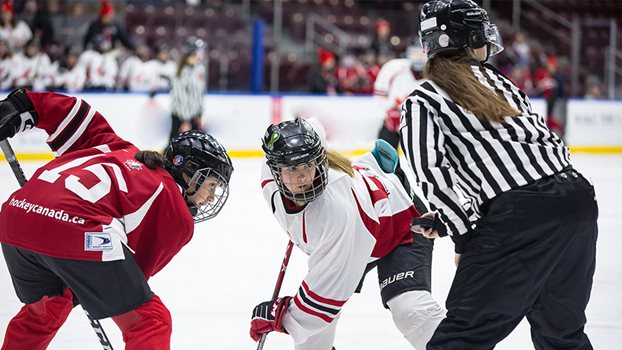
A chance to challenge
Coaches, administrators and fans of the game gathered virtually for the National Female Hockey Forum and Women’s Hockey Summit
After a weekend of spirited discussion about the women’s game, there was one key take away for Amy Walsh.
“I’m not alone.”
The executive director of Hockey Nova Scotia was a contributor to the National Female Hockey Forum and panellist for the Women’s Hockey Summit, both features of Hockey Canada’s 2021 Spring Congress, which took place virtually from May 6-9. She said both events were inspiring but also an honest look at the state of women’s hockey. Much of the discussion focused on the obstacles still faced in the game and potential ways to overcome those.
“Just statements aren’t enough and talk is not enough. I think it needs to be action and potentially some bold action,” Walsh says. “[Those actions] need to be intentional. Women need to be asked, women need to be sponsored, there needs to be seats at the table.”
“I really hope people will go out there and take action, impact their pieces of society but the reality is slow evolution of change,” says Stephanie White, chair of the Hockey Canada Female Hockey Policy Committee, which hosted the two events. White added this forum was just the first of many more discussions to come.
“This is not something that we’ve solved the problem with one weekend so we will need to continue this work and continue to education and continue to grow so that we can actually grow the game.”
The National Female Hockey Forum brought together nearly 200 delegates from Hockey Canada and its Members. Barry Reynard, a Hockey Canada director, sits on the policy committee with White and is also part of the Female Canadian Development Model task team. He said one goal of the weekend was getting hockey governance, athletes and administrators to the same table.
“We’ve never brought those people and those minds together,” Reynard says. “I think that this is one of the outcomes of [these events] … the good work of the committees is very close to some very powerful opportunities.”
One of those opportunities lies with Hockey Canada’s renewed commitment to equity, diversity and inclusion; ensuring new voices and varied experiences are sought out and welcomed. Walsh said there were signs of this during the Women’s Hockey Summit, with panellists of different hockey backgrounds discussing women’s leadership opportunities and growing the game. They also answered questions from more than 600 people in the virtual audience.
“It was a good first step and an eye-opening experience for some of the participants,” Walsh says.
“In a way, I think we challenged some people. I think there was some good learning for a variety of people so I hope that people have gone away themselves ready to take action in whatever way they can,” White adds.
Hockey Canada is taking action to empower those in the women’s game through the Pond to Podium development series. The first set of webinars was hosted by Olympic gold medallist and two-time world champion Tessa Bonhomme. Pond to Podium gives grassroots players access to the coaches, players and administrators of Canada’s National Women’s Team.
For more information on the Pond to Podium development series, please visit HockeyCanada.ca/PondtoPodium.
For more information: |
- <
- >
